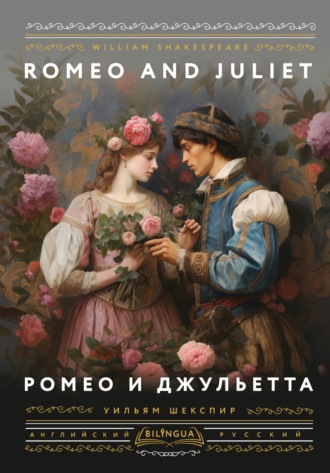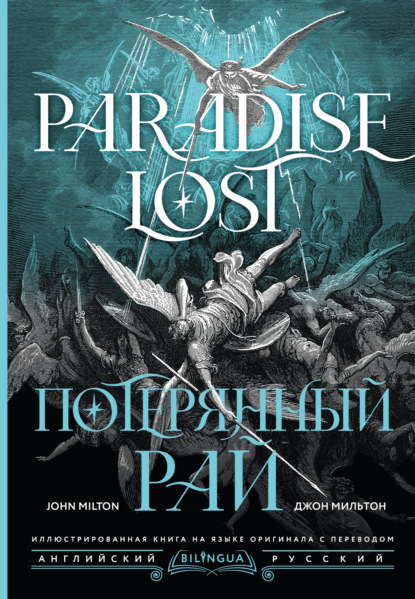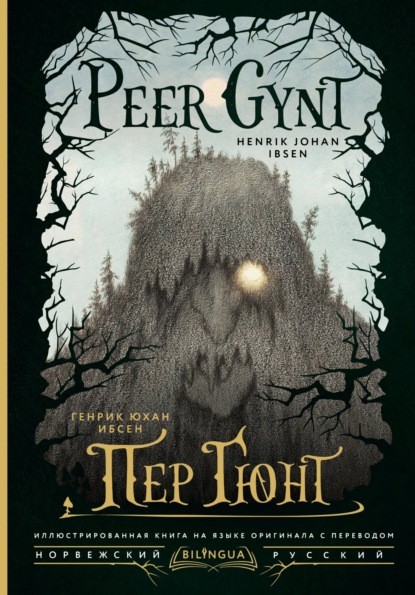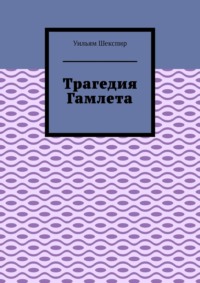
Полная версия
Romeo and Juliet / Ромео и Джульетта
[Nurse calls within.]
Anon, good Nurse! – Sweet Montague be true.
Stay but a little, I will come again.
[Exit.]
RomeoO blessed, blessed night. I am afeard,
Being in night, all this is but a dream,
Too flattering sweet to be substantial.
Enter Juliet above.
JulietThree words, dear Romeo, and good night indeed.
If that thy bent of love be honourable,
Thy purpose marriage, send me word tomorrow,
By one that I’ll procure to come to thee,
Where and what time thou wilt perform the rite,
And all my fortunes at thy foot I’ll lay
And follow thee my lord throughout the world.
Nurse[Within.] Madam.
JulietI come, anon.– But if thou meanest not well,
I do beseech thee,-
Nurse[Within.] Madam.
JulietBy and by I come-
To cease thy strife and leave me to my grief.
Tomorrow will I send.
RomeoSo thrive my soul,-
JulietA thousand times good night.
[Exit.]
RomeoA thousand times the worse, to want thy light.
Love goes toward love as schoolboys from their books,
But love from love, towards school with heavy looks.
[Retiring slowly.]
Re-enter Juliet, above.
JulietHist! Romeo, hist! O for a falconer’s voice
To lure this tassel-gentle back again.
Bondage is hoarse and may not speak aloud,
Else would I tear the cave where Echo lies,
And make her airy tongue more hoarse than mine
With repetition of my Romeo’s name.
RomeoIt is my soul that calls upon my name.
How silver-sweet sound lovers’ tongues by night,
Like softest music to attending ears.
JulietRomeo!
RomeoMy nyas?
JulietWhat o’clock tomorrow
Shall I send to thee?
RomeoBy the hour of nine.
JulietI will not fail. ’Tis twenty years till then.
I have forgot why I did call thee back.
RomeoLet me stand here till thou remember it.
JulietI shall forget, to have thee still stand there,
Remembering how I love thy company.
RomeoAnd I’ll still stay, to have thee still forget,
Forgetting any other home but this.
Juliet’Tis almost morning; I would have thee gone,
And yet no farther than a wanton’s bird,
That lets it hop a little from her hand,
Like a poor prisoner in his twisted gyves,
And with a silk thread plucks it back again,
So loving-jealous of his liberty.
RomeoI would I were thy bird.
JulietSweet, so would I:
Yet I should kill thee with much cherishing.
Good night, good night. Parting is such sweet sorrow
That I shall say good night till it be morrow.
[Exit.]
RomeoSleep dwell upon thine eyes, peace in thy breast.
Would I were sleep and peace, so sweet to rest.
Hence will I to my ghostly Sire’s cell,
His help to crave and my dear hap to tell.
[Exit.]
Scene III
Friar Lawrence’s Cell. Enter Friar Lawrence with a basket.
Friar LawrenceThe grey-ey’d morn smiles on the frowning night,
Chequering the eastern clouds with streaks of light;
And fleckled darkness like a drunkard reels
From forth day’s pathway, made by Titan’s fiery wheels
Now, ere the sun advance his burning eye,
The day to cheer, and night’s dank dew to dry,
I must upfill this osier cage of ours
With baleful weeds and precious-juiced flowers.
The earth that’s nature’s mother, is her tomb;
What is her burying grave, that is her womb:
And from her womb children of divers kind
We sucking on her natural bosom find.
Many for many virtues excellent,
None but for some, and yet all different.
O, mickle is the powerful grace that lies
In plants, herbs, stones, and their true qualities.
For naught so vile that on the earth doth live
But to the earth some special good doth give;
Nor aught so good but, strain’d from that fair use,
Revolts from true birth, stumbling on abuse.
Virtue itself turns vice being misapplied,
And vice sometime’s by action dignified.
Within the infant rind of this weak flower
Poison hath residence, and medicine power:
For this, being smelt, with that part cheers each part;
Being tasted, slays all senses with the heart.
Two such opposed kings encamp them still
In man as well as herbs, – grace and rude will;
And where the worser is predominant,
Full soon the canker death eats up that plant.
Enter Romeo.
RomeoGood morrow, father.
Friar LawrenceBenedicite!
What early tongue so sweet saluteth me?
Young son, it argues a distemper’d head
So soon to bid good morrow to thy bed.
Care keeps his watch in every old man’s eye,
And where care lodges sleep will never lie;
But where unbruised youth with unstuff’d brain
Doth couch his limbs, there golden sleep doth reign.
Therefore thy earliness doth me assure
Thou art uprous’d with some distemperature;
Or if not so, then here I hit it right,
Our Romeo hath not been in bed tonight.
RomeoThat last is true; the sweeter rest was mine.
Friar LawrenceGod pardon sin. Wast thou with Rosaline?
RomeoWith Rosaline, my ghostly father? No.
I have forgot that name, and that name’s woe.
Friar LawrenceThat’s my good son. But where hast thou been then?
RomeoI’ll tell thee ere thou ask it me again.
I have been feasting with mine enemy,
Where on a sudden one hath wounded me
That’s by me wounded. Both our remedies
Within thy help and holy physic lies.
I bear no hatred, blessed man; for lo,
My intercession likewise steads my foe.
Friar LawrenceBe plain, good son, and homely in thy drift;
Riddling confession finds but riddling shrift.
RomeoThen plainly know my heart’s dear love is set
On the fair daughter of rich Capulet
As mine on hers, so hers is set on mine;
And all combin’d, save what thou must combine
By holy marriage. When, and where, and how
We met, we woo’d, and made exchange of vow,
I’ll tell thee as we pass; but this I pray,
That thou consent to marry us today.
Friar LawrenceHoly Saint Francis! What a change is here!
Is Rosaline, that thou didst love so dear,
So soon forsaken? Young men’s love then lies
Not truly in their hearts, but in their eyes.
Jesu Maria, what a deal of brine
Hath wash’d thy sallow cheeks for Rosaline!
How much salt water thrown away in waste,
To season love, that of it doth not taste.
The sun not yet thy sighs from heaven clears,
Thy old groans yet ring in mine ancient ears.
Lo here upon thy cheek the stain doth sit
Of an old tear that is not wash’d off yet.
If ere thou wast thyself, and these woes thine,
Thou and these woes were all for Rosaline,
And art thou chang’d? Pronounce this sentence then,
Women may fall, when there’s no strength in men.
RomeoThou chidd’st me oft for loving Rosaline.
Friar LawrenceFor doting, not for loving, pupil mine.
RomeoAnd bad’st me bury love.
Friar LawrenceNot in a grave
To lay one in, another out to have.
RomeoI pray thee chide me not, her I love now
Doth grace for grace and love for love allow.
The other did not so.
Friar LawrenceO, she knew well
Thy love did read by rote, that could not spell.
But come young waverer, come go with me,
In one respect I’ll thy assistant be;
For this alliance may so happy prove,
To turn your households’ rancour to pure love.
RomeoO let us hence; I stand on sudden haste.
Friar LawrenceWisely and slow; they stumble that run fast.
[Exeunt.]
Scene IV
A Street. Enter Benvolio and Mercutio.
MercutioWhere the devil should this Romeo be? Came he not home tonight?
BenvolioNot to his father’s; I spoke with his man.
MercutioWhy, that same pale hard-hearted wench, that Rosaline, torments him so that he will sure run mad.
BenvolioTybalt, the kinsman to old Capulet, hath sent a letter to his father’s house.
MercutioA challenge, on my life.
BenvolioRomeo will answer it.
MercutioAny man that can write may answer a letter.
BenvolioNay, he will answer the letter’s master, how he dares, being dared.
MercutioAlas poor Romeo, he is already dead, stabbed with a white wench’s black eye; run through the ear with a love song, the very pin of his heart cleft with the blind bow-boy’s butt-shaft. And is he a man to encounter Tybalt?
BenvolioWhy, what is Tybalt?
MercutioMore than Prince of cats. O, he’s the courageous captain of compliments. He fights as you sing prick-song, keeps time, distance, and proportion. He rests his minim rest, one, two, and the third in your bosom: the very butcher of a silk button, a duellist, a duellist; a gentleman of the very first house, of the first and second cause. Ah, the immortal passado, the punto reverso, the hay.
BenvolioThe what?
MercutioThe pox of such antic lisping, affecting phantasies; these new tuners of accent. By Jesu, a very good blade, a very tall man, a very good whore. Why, is not this a lamentable thing, grandsire, that we should be thus afflicted with these strange flies, these fashion-mongers, these pardon-me’s, who stand so much on the new form that they cannot sit at ease on the old bench? O their bones, their bones!
Enter Romeo.
BenvolioHere comes Romeo, here comes Romeo!
MercutioWithout his roe, like a dried herring. O flesh, flesh, how art thou fishified! Now is he for the numbers that Petrarch flowed in. Laura, to his lady, was but a kitchen wench, – marry, she had a better love to berhyme her: Dido a dowdy; Cleopatra a gypsy; Helen and Hero hildings and harlots; Thisbe a grey eye or so, but not to the purpose. Signior Romeo, bonjour! There’s a French salutation to your French slop. You gave us the counterfeit fairly last night.
RomeoGood morrow to you both. What counterfeit did I give you?
MercutioThe slip sir, the slip; can you not conceive?
RomeoPardon, good Mercutio, my business was great, and in such a case as mine a man may strain courtesy.
MercutioThat’s as much as to say, such a case as yours constrains a man to bow in the hams.
RomeoMeaning, to curtsy.
MercutioThou hast most kindly hit it.
RomeoA most courteous exposition.
MercutioNay, I am the very pink of courtesy.
RomeoPink for flower.
MercutioRight.
RomeoWhy, then is my pump well flowered.
MercutioSure wit, follow me this jest now, till thou hast worn out thy pump, that when the single sole of it is worn, the jest may remain after the wearing, solely singular.
RomeoO single-soled jest, solely singular for the singleness!
MercutioCome between us, good Benvolio; my wits faint.
RomeoSwits and spurs, swits and spurs; or I’ll cry a match.
MercutioNay, if thy wits run the wild-goose chase, I am done. For thou hast more of the wild-goose in one of thy wits, than I am sure, I have in my whole five. Was I with you there for the goose?
RomeoThou wast never with me for anything, when thou wast not there for the goose.
MercutioI will bite thee by the ear for that jest.
RomeoNay, good goose, bite not.
MercutioThy wit is a very bitter sweeting, it is a most sharp sauce.
RomeoAnd is it not then well served in to a sweet goose?
MercutioO here’s a wit of cheveril, that stretches from an inch narrow to an ell broad.
RomeoI stretch it out for that word broad, which added to the goose, proves thee far and wide a broad goose.
MercutioWhy, is not this better now than groaning for love? Now art thou sociable, now art thou Romeo; now art thou what thou art, by art as well as by nature. For this drivelling love is like a great natural, that runs lolling up and down to hide his bauble in a hole.
BenvolioStop there, stop there.
MercutioThou desirest me to stop in my tale against the hair.
BenvolioThou wouldst else have made thy tale large.
MercutioO, thou art deceived; I would have made it short, for I was come to the whole depth of my tale, and meant indeed to occupy the argument no longer.
Enter Nurse and Peter.
RomeoHere’s goodly gear!
A sail, a sail!
MercutioTwo, two; a shirt and a smock.
NursePeter!
PeterAnon.
NurseMy fan, Peter.
MercutioGood Peter, to hide her face; for her fan’s the fairer face.
NurseGod ye good morrow, gentlemen.
MercutioGod ye good-den, fair gentlewoman.
NurseIs it good-den?
Mercutio’Tis no less, I tell ye; for the bawdy hand of the dial is now upon the prick of noon.
NurseOut upon you! What a man are you?
RomeoOne, gentlewoman, that God hath made for himself to mar.
NurseBy my troth, it is well said; for himself to mar, quoth a? Gentlemen, can any of you tell me where I may find the young Romeo?
RomeoI can tell you: but young Romeo will be older when you have found him than he was when you sought him. I am the youngest of that name, for fault of a worse.
NurseYou say well.
MercutioYea, is the worst well? Very well took, i’faith; wisely, wisely.
NurseIf you be he, sir, I desire some confidence with you.
BenvolioShe will endite him to some supper.
MercutioA bawd, a bawd, a bawd! So ho!
RomeoWhat hast thou found?
MercutioNo hare, sir; unless a hare, sir, in a lenten pie, that is something stale and hoar ere it be spent.
[Sings.]
An old hare hoar,
And an old hare hoar,
Is very good meat in Lent;
But a hare that is hoar
Is too much for a score
When it hoars ere it be spent.
Romeo, will you come to your father’s? We’ll to dinner thither.
RomeoI will follow you.
MercutioFarewell, ancient lady; farewell, lady, lady, lady.
[Exeunt Mercutio and Benvolio]
NurseI pray you, sir, what saucy merchant was this that was so full of his ropery?
RomeoA gentleman, Nurse, that loves to hear himself talk, and will speak more in a minute than he will stand to in a month.
NurseAnd a speak anything against me, I’ll take him down, and a were lustier than he is, and twenty such Jacks. And if I cannot, I’ll find those that shall. Scurvy knave! I am none of his flirt-gills; I am none of his skains-mates.-And thou must stand by too and suffer every knave to use me at his pleasure!
PeterI saw no man use you at his pleasure; if I had, my weapon should quickly have been out. I warrant you, I dare draw as soon as another man, if I see occasion in a good quarrel, and the law on my side.
NurseNow, afore God, I am so vexed that every part about me quivers. Scurvy knave. Pray you, sir, a word: and as I told you, my young lady bid me enquire you out; what she bade me say, I will keep to myself. But first let me tell ye, if ye should lead her in a fool’s paradise, as they say, it were a very gross kind of behaviour, as they say; for the gentlewoman is young. And therefore, if you should deal double with her, truly it were an ill thing to be offered to any gentlewoman, and very weak dealing.
RomeoNurse, commend me to thy lady and mistress. I protest unto thee,-
NurseGood heart, and i’faith I will tell her as much. Lord, Lord, she will be a joyful woman.
RomeoWhat wilt thou tell her, Nurse? Thou dost not mark me.
NurseI will tell her, sir, that you do protest, which, as I take it, is a gentlemanlike offer.
RomeoBid her devise
Some means to come to shrift this afternoon,
And there she shall at Friar Lawrence’ cell
Be shriv’d and married. Here is for thy pains.
NurseNo truly, sir; not a penny.
RomeoGo to; I say you shall.
NurseThis afternoon, sir? Well, she shall be there.
RomeoAnd stay, good Nurse, behind the abbey wall.
Within this hour my man shall be with thee,
And bring thee cords made like a tackled stair,
Which to the high topgallant of my joy
Must be my convoy in the secret night.
Farewell, be trusty, and I’ll quit thy pains;
Farewell; commend me to thy mistress.
NurseNow God in heaven bless thee. Hark you, sir.
RomeoWhat say’st thou, my dear Nurse?
NurseIs your man secret? Did you ne’er hear say,
Two may keep counsel, putting one away?
RomeoI warrant thee my man’s as true as steel.
NurseWell, sir, my mistress is the sweetest lady. Lord, Lord! When ’twas a little prating thing, – O, there is a nobleman in town, one Paris, that would fain lay knife aboard; but she, good soul, had as lief see a toad, a very toad, as see him. I anger her sometimes, and tell her that Paris is the properer man, but I’ll warrant you, when I say so, she looks as pale as any clout in the versal world. Doth not rosemary and Romeo begin both with a letter?
RomeoAy, Nurse; what of that? Both with an R.
NurseAh, mocker! That’s the dog’s name. R is for the-no, I know it begins with some other letter, and she hath the prettiest sententious of it, of you and rosemary, that it would do you good to hear it.
RomeoCommend me to thy lady.
NurseAy, a thousand times. Peter!
[Exit Romeo]
PeterAnon.
NurseBefore and apace.
[Exeunt.]
Scene V

Capulet’s Garden. Enter Juliet.
JulietThe clock struck nine when I did send the Nurse,
In half an hour she promised to return.
Perchance she cannot meet him. That’s not so.
O, she is lame. Love’s heralds should be thoughts,
Which ten times faster glides than the sun’s beams,
Driving back shadows over lowering hills:
Therefore do nimble-pinion’d doves draw love,
And therefore hath the wind-swift Cupid wings.
Now is the sun upon the highmost hill
Of this day’s journey, and from nine till twelve
Is three long hours, yet she is not come.
Had she affections and warm youthful blood,
She’d be as swift in motion as a ball;
My words would bandy her to my sweet love,
And his to me.
But old folks, many feign as they were dead;
Unwieldy, slow, heavy and pale as lead.
Enter Nurse and Peter.
O God, she comes. O honey Nurse, what news?
Hast thou met with him? Send thy man away.
NursePeter, stay at the gate.
[Exit Peter.]
JulietNow, good sweet Nurse, – O Lord, why look’st thou sad?
Though news be sad, yet tell them merrily;
If good, thou sham’st the music of sweet news
By playing it to me with so sour a face.
NurseI am aweary, give me leave awhile;
Fie, how my bones ache! What a jaunt have I had!
JulietI would thou hadst my bones, and I thy news:
Nay come, I pray thee speak; good, good Nurse, speak.
NurseJesu, what haste? Can you not stay a while? Do you not see that I am out of breath?
JulietHow art thou out of breath, when thou hast breath
To say to me that thou art out of breath?
The excuse that thou dost make in this delay
Is longer than the tale thou dost excuse.
Is thy news good or bad? Answer to that;
Say either, and I’ll stay the circumstance.
Let me be satisfied, is’t good or bad?
NurseWell, you have made a simple choice; you know not how to choose a man. Romeo? No, not he. Though his face be better than any man’s, yet his leg excels all men’s, and for a hand and a foot, and a body, though they be not to be talked on, yet they are past compare. He is not the flower of courtesy, but I’ll warrant him as gentle as a lamb. Go thy ways, wench, serve God. What, have you dined at home?
JulietNo, no. But all this did I know before.
What says he of our marriage? What of that?
NurseLord, how my head aches! What a head have I!
It beats as it would fall in twenty pieces.
My back o’ t’other side, – O my back, my back!
Beshrew your heart for sending me about
To catch my death with jauncing up and down.
JulietI’faith, I am sorry that thou art not well.
Sweet, sweet, sweet Nurse, tell me, what says my love?
NurseYour love says like an honest gentleman,
And a courteous, and a kind, and a handsome,
And I warrant a virtuous, – Where is your mother?
JulietWhere is my mother? Why, she is within.
Where should she be? How oddly thou repliest.
‘Your love says, like an honest gentleman’,
‘Where is your mother?’
NurseO God’s lady dear,
Are you so hot? Marry, come up, I trow.
Is this the poultice for my aching bones?
Henceforward do your messages yourself.
JulietHere’s such a coil. Come, what says Romeo?
NurseHave you got leave to go to shrift today?
JulietI have.
NurseThen hie you hence to Friar Lawrence’ cell;
There stays a husband to make you a wife.
Now comes the wanton blood up in your cheeks,
They’ll be in scarlet straight at any news.
Hie you to church. I must another way,
To fetch a ladder by the which your love
Must climb a bird’s nest soon when it is dark.
I am the drudge, and toil in your delight;
But you shall bear the burden soon at night.
Go. I’ll to dinner; hie you to the cell.
JulietHie to high fortune! Honest Nurse, farewell.
[Exeunt.]
Scene VI

Friar Lawrence’s Cell. Enter Friar Lawrence and Romeo.
Friar LawrenceSo smile the heavens upon this holy act
That after-hours with sorrow chide us not.
RomeoAmen, amen, but come what sorrow can,
It cannot countervail the exchange of joy
That one short minute gives me in her sight.
Do thou but close our hands with holy words,
Then love-devouring death do what he dare,
It is enough I may but call her mine.
Friar LawrenceThese violent delights have violent ends,
And in their triumph die; like fire and powder,
Which as they kiss consume. The sweetest honey
Is loathsome in his own deliciousness,
And in the taste confounds the appetite.
Therefore love moderately: long love doth so;
Too swift arrives as tardy as too slow.
Enter Juliet.
Here comes the lady. O, so light a foot
Will ne’er wear out the everlasting flint.
A lover may bestride the gossamers
That idles in the wanton summer air
And yet not fall; so light is vanity.
JulietGood even to my ghostly confessor.
Friar LawrenceRomeo shall thank thee, daughter, for us both.
JulietAs much to him, else is his thanks too much.
RomeoAh, Juliet, if the measure of thy joy
Be heap’d like mine, and that thy skill be more
To blazon it, then sweeten with thy breath
This neighbour air, and let rich music’s tongue
Unfold the imagin’d happiness that both
Receive in either by this dear encounter.
JulietConceit more rich in matter than in words,
Brags of his substance, not of ornament.
They are but beggars that can count their worth;
But my true love is grown to such excess,
I cannot sum up sum of half my wealth.
Friar LawrenceCome, come with me, and we will make short work,
For, by your leaves, you shall not stay alone
Till holy church incorporate two in one.
[Exeunt.]
Act III
Scene I
A public Place. Enter Mercutio, Benvolio,
Page and Servants.
BenvolioI pray thee, good Mercutio, let’s retire:
The day is hot, the Capulets abroad,
And if we meet, we shall not scape a brawl,
For now these hot days, is the mad blood stirring.
MercutioThou art like one of these fellows that, when he enters the confines of a tavern, claps me his sword upon the table, and says ‘God send me no need of thee!’ and by the operation of the second cup draws him on the drawer, when indeed there is no need.
BenvolioAm I like such a fellow?
MercutioCome, come, thou art as hot a Jack in thy mood as any in Italy; and as soon moved to be moody, and as soon moody to be moved.
BenvolioAnd what to?
MercutioNay, an there were two such, we should have none shortly, for one would kill the other. Thou? Why, thou wilt quarrel with a man that hath a hair more or a hair less in his beard than thou hast. Thou wilt quarrel with a man for cracking nuts, having no other reason but because thou hast hazel eyes. What eye but such an eye would spy out such a quarrel? Thy head is as full of quarrels as an egg is full of meat, and yet thy head hath been beaten as addle as an egg for quarrelling. Thou hast quarrelled with a man for coughing in the street, because he hath wakened thy dog that hath lain asleep in the sun. Didst thou not fall out with a tailor for wearing his new doublet before Easter? with another for tying his new shoes with an old riband? And yet thou wilt tutor me from quarrelling!












